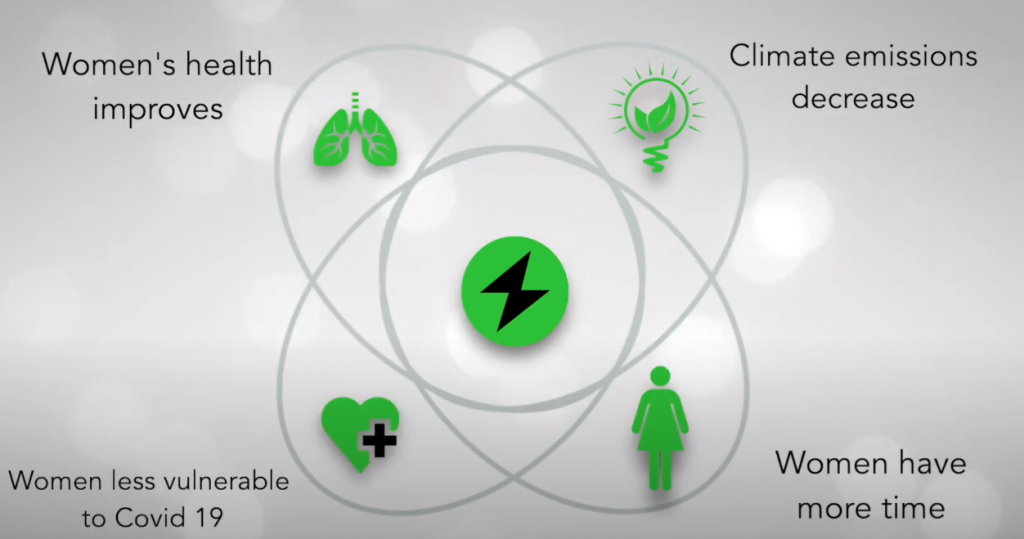- Date
- 14th July 2020
- Categories
By Dr Simon Batchelor.
A new working paper by Prof Ed Brown and myself (S Batchelor), outlines why Covid 19 recovery plans should focus on an integrated response to modern energy access for cooking which enhances women and children’s lives. We present the idea that in a world that is considering how it will recover from the first wave of the Covid 19 virus and how it will live with its ongoing impacts, utilizing Covid 19 recovery plans to accelerate the transition of those who use biomass for cooking to modern energy cooking services could be a very effective strategy with multiple gains.

The intersectional nature of the biomass cooking challenge is such that if recovery plans leverage existing and recovery finance to lower the impact of subsequent waves of the virus on women and children, it will also improve our economic responses to the emerging global recession, accelerate responses to climate change and make rapid gains on three sustainable development goals; SDG 3 Ensure healthy lives and promote well-being for all at all ages, Sustainable Development Goal (SDG) 5 Gender equity and SDG 7, access to reliable, sustainable, affordable modern energy for all (inclusive of their cooking needs).
The paper sets out seven key concepts that we argue should be integrated into national Covid recovery plans in order to address what we have identified as a crucial Cooking, Health, Energy, Environment, and Gender nexus (CHEEG).
Integrate plans for accelerated access to modern energy cooking services with plans for electrical infrastructure development. Electricity for cooking has been ignored for too long, with many decision makers arguing that it is too expensive for the majority of people, and that LMICs do not have enough generating capacity to promote widespread adoption. Advances in renewable energy technology and recent investments in generating capacity are, however, challenging the latter, and recent research with energy efficient appliances has proven that cooking with electricity can be extremely cost effective and affordable given the right contextual conditions.
There is a role for LPG in the toolkit of responses. While electricity presents a clean cooking opportunity that should be nurtured under Covid recovery plans, there is also a case for LPG to be part of the modern energy cooking services Covid recovery portfolio.
Identify and justify transition finance. How are the recovery plans to be financed? How does the world with its shrinking economy find the upfront capital to enable billions of biomass users to transition to modern energy? The paper shows how the past few years have seen many calls for increased attention and finance to be given to the financing of clean energy transitions. Whilst funding for electrification efforts was/is relatively buoyant (although of course more could be done), the gaps in relation to the funding of clean cooking transitions are without exception depicted as being far more challenging. By integrating clean cooking with electrical planning, revenue collection can be built into strategies much more easily, and such strategies become more convincing to investors.
Use lifeline tariffs to ensure inclusion of the poor. A rapid acceleration in the spread of modern energy cooking services needs to be accompanied by measures that ensure that this access is made available to the poorest and most marginalized social sectors.
Balance increased tax collection with lifeline tariffs. It may seem at odds in a recovery strategy to talk about tax revenue, but such a consideration will enable long term sustainability for the strategy. In the short term utilities may not be able to maintain the balance between lifeline tariff users and premium customers particularly as the Covid recession reduces energy consumption in manufacturing industries, nevertheless the long-term commitment to utilities and their infrastructure are a solid stable ground for recovery strategies. Bringing the informal expenditure of households on polluting fuels into the formal sector of electricity (and LPG) provision, offers an opportunity for tax revenue collection to replenish the treasury finances.
Strengthen decentralised energy and governance systems. This section of the paper discusses how energy systems are becoming increasingly decentralized with power generation for the national grid being decentralized through the growth of renewable energy technologies. If Covid recovery plans are to be sustainable then they need to be embedded effectively within these decentralized governance landscapes.
Empower women within industry and governance. Building on the importance of ensuring that the response to Covid is based on integrated locally-owned strategies where energy, health, water and other forms of service delivery are brought together more effectively, the final section of the paper goes on to argue that women need to bemore explicitly represented (a) in the planning processes as actual decision makers, (b) in the implementation within the supply side value chain, and (c) in the informal economy responses that will create multiplier effects from the use of modern energy cooking services.

The paper was the basis of a video that was presented by the Kenyan government at a High-Level Political Forum on Sustainable Development (July 2020) side meeting. The side event was called Accelerated Actions and Transformative Pathways on Clean Cooking for the Delivery of Sustainable Development Goal 7, and hosted by the Kenyan government in partnership with Hivos, ENERGIA, MECS, TENN, Clean Cooking Alliance, ESMAP, UNDESA, WHO, World Bank.
The video can be found here:
As a working paper we welcome comment and suggestions for improvements.